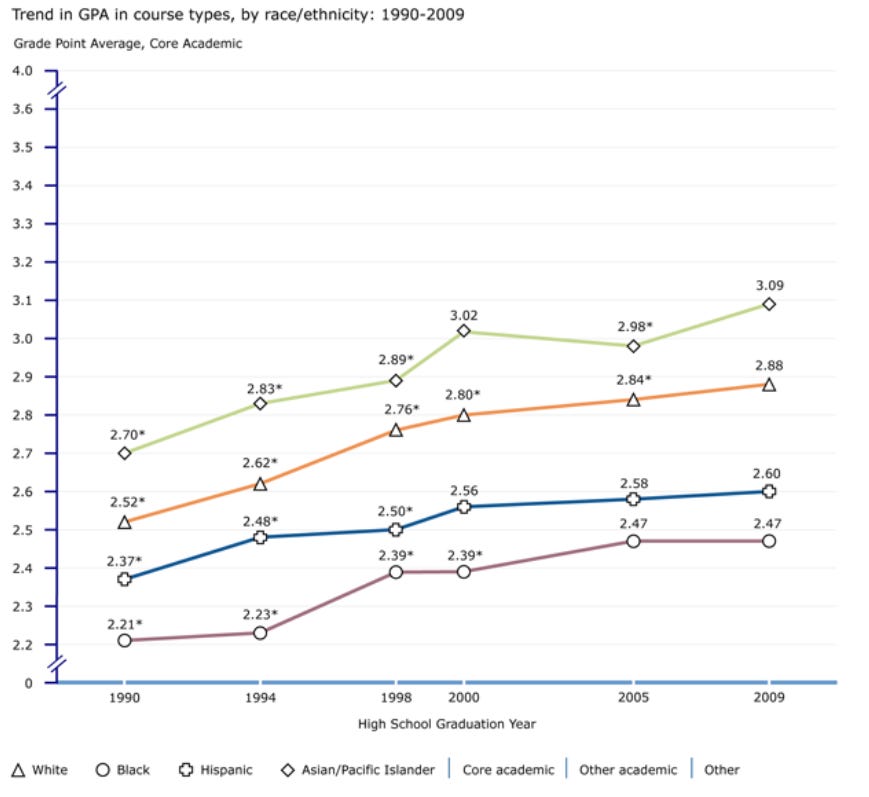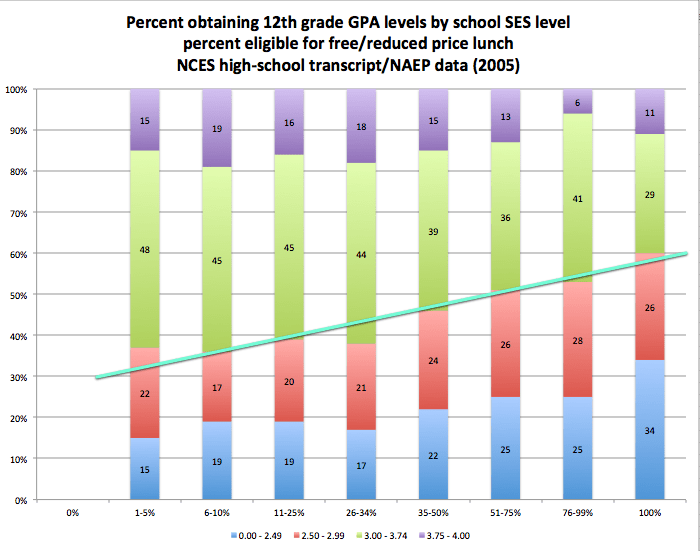Racial Disparities in the SATs Are Exactly What Antiracists Should Predict
it's implied by their most elementary observations of the world
The SAT is officially gone from the University of California because they’re desperate to reduce the Asian student population they want greater racial diversity. Many prominent liberals have celebrated this news, largely because they already went to college and don’t mind pulling up that ladder behind them. (Also a lot of them didn’t get the scores they wanted and never got over it.) Unfortunately for them, essentially all educational metrics show the racial and income stratification that the SAT shows. That includes GPA, which the people who complain about the SAT constantly nominate as an alternative to… the racial and income stratification of the SAT!
Note too that this is before adjustment via the black-box algorithms that elite universities use to adjust for the inherent noise in GPA. (I say again: some big-time publication should absolutely send someone to report that story out for a year. It’s an area of major public interest in which the industry works under remarkable secrecy.) It’s such an audaciously dishonest conversation that we’re having, attacking one quantitative indicator for demonstrating the same dynamics as the quantitative indicator that’s been nominated to replace it. But then, of course GPA and SAT data agree. It would be bizarre and concerning if the SAT did not agree with GPA data, NAEP data, state standardized test data, attendance and behavioral data, data from academic research, and sundry other educational data that shows these racial and income dynamics. The SAT showing racial and income stratification isn’t a mark of the SAT’s weakness but of its strength. That the SAT demonstrates these effects shows that the test is accurately measuring its construct. It can’t assess the broader sociopolitical conditions that created this dynamic, nor their fairness, as it wasn’t designed to do that.
Now, I suppose my saying that the SAT and other metrics show that poorer students and Black and Hispanic students are genuinely less prepared (on average) would inflame the sensibilities of people who identify as antiracists. But I find that strange - such students being held back in the classroom by structural disadvantage would seem to fit perfectly well with the antiracist worldview. Antiracists (an obnoxious term but let’s roll with it) will tell you that many Black students face all manner of disadvantages in life that can depress their academic performance, and they are correct to do so. But then isn’t it profoundly odd that they’re so angry at the SAT for demonstrating the outcome of that disadvantage? If the test shows Black and poor students struggling, it’s only an indicator of precisely the conditions they think are real and meaningful and troubling. Why would they want to silence that indicator? How does it help them?
You could say that this just proves that we need muscular affirmative action programs to help address this inequality, and I agree, with some important caveats. The first is to understand that actually-existing race-based affirmative action, in many contexts, simply serves as another means for schools to cream the students whose parents are most able to donate, as I’ve discussed here several times. If you create rules for preferential treatment you’ll get colleges that honor the letter of those rules and not the spirit and you’re just further benefiting applicants who already have a host of advantages. The second qualification is this: it’s an act of cruelty to let students you know are less prepared into your college without providing robust (and mandatory) remediation. You let them in despite worse academic preparedness than their peers; if you don’t address that lack of preparedness in a systematic fashion you’re setting them up to fail. But remediation is expensive for institutions and potentially for students if the school doesn’t agree to eat the costs. Then again, what’s the point of letting them in if they don’t get the degree, or getting them the degree if it doesn’t connote actual learning and skills?
And that gets at the essential point that while these disparities are the product of unfairness they are nevertheless real. The average Black student really does struggle more with reading and algebra etc. than the average white student, and the average rich student really does perform better than the average poor student. Again, this is absolutely what you’d expect if you have a progressive outlook on structural disadvantage. But we can’t get anywhere if we pretend that these gaps are the product of measurement error, nor by positing an immense conspiracy among millions of teachers and administrators to pretend that Black and poor students are struggling when they aren’t. In the long run, such denialism hurts precisely the students it ostensibly helps, as it does nothing to fill in the gaps of human capital under which they suffer. I have very few good things to say about old guard education reform types, but they have always been willing to look at such gaps and understand that the gaps themselves, the underlying lack of ability, are the core problem, the core injustice. Disadvantaged students struggling to get into college is a symptom, not the disease. And the SAT are merely a thermometer that diagnoses that disease.
Flogging the SATs for failing to fix disparities that it can’t possibly be blamed for, like insisting that we just need to spend more money when we’ve been trying to spend our way out of our problems for 40 years, says more about the problems we refuse to look at than anything else, our commitment to myopia.
Some look at the gatekeeping function of college itself and decide that we should get rid of it entirely. Well, I wrote a book that looks at radical approaches to schooling, and in my ideal world I think I would prefer a system of weighted lotteries to competitive college admissions. But such a thing would have to exist in a profoundly different educational and economic system than the one we have now. For one thing, elite schools would cease to be elite in any meaningful sense, and their alumni would not enjoy the benefits that accrue to such graduates today - not so bad on its face, but such a change would eliminate the advantage reformers want to spread to more disadvantaged students. The benefits would be more diffuse. To my frustration, many who complain most vociferously about the SAT and the gaps it reveals are not receptive to truly radical changes to what college is and how it functions. They just want more Black kids to get into Harvard. Setting aside the abundant problems with this entire school of race politics, where you try to diversify the elite first and then somehow get to broad justice later, this reveals the fundamental conflict at the heart of our entire educational philosophy: we demand that our education system create equality while continuing to act as a sorting system that places people on a hierarchy of good and bad. We have never resolved that contradiction because it cannot be resolved. What we are asking for is nonsensical.
It’s hard to be poor. It’s especially hard to be Black and poor. Of course that has consequences for standardized test scores, including the SAT. But attacking those tests for revealing a simple consequence of the conditions you yourself describe elsewhere is unhelpful. When you add that to the fact that the metrics you prefer to rely on show the same disparities, it becomes out-and-out bizarre. But that’s where we’re at with race relations and inequality in this country, lashing out wildly, fixating on the wrong things, and refusing to confront the larger reality.






"...this entire school of race politics, where you try to diversify the elite first and then somehow get to broad justice later...."
I don't know who pointed this out first, but this whole thing is basically Reaganomics but with race and gender. It's all built on the idea that if you diversify the elites, it'll naturally "trickle down" to other areas of life. Clearly I don't think it works.
Oh God the funding "issue". If I hear one more Leftist tell me that American schools are underfunded I might blow my brains out. Please tell me more about how America, the country that spends 50% more per-pupil on K-12 ed than Germany and New Zealand, is spending too LITTLE on schools.
I think this is my main gripe with Leftists now - every problem is boiled down to "the government isn't throwing enough money at the problem" when a lot (dare I say most) problems in the US have very little to do with how much public money we throw at it.